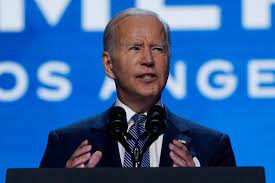Los Angeles, June 10:President Joe Biden tried to present a unifying vision for the Western Hemisphere on Thursday but the Summit of the Americas quickly spilled into open discord, a telling illustration of the difficulties of bringing North and South America together around shared goals on migration, the economy and climate.
“There is no reason why the Western Hemisphere can’t be the most forward looking, most democratic, most prosperous, most peaceful, secure region in the world,” Biden said at the start of the summit. “We have unlimited potential.”
Quick on the heels of Biden’s remarks, Belize Prime Minister John Briceño publicly objected to countries being excluded from the summit by the U.S. And to the continued U.S. Embargo on Cuba.
“This summit belongs to all of the Americas — it is therefore inexcusable that there are countries of the Americas that are not here, and the power of the summit is diminished by their absence,” Briceño said. “At this most critical juncture, when the future of our hemisphere is at stake, we stand divided. And that is why the Summit of the Americas should have been inclusive. Geography, not politics, defines the Americas.”
Biden faced additional criticism from Argentina’s President Alberto Fernández.
“We definitely would have wished for a different Summit of the Americas,” Fernández said in Spanish. “The silence of those who are absent is calling to us.”
The backlash over exclusions occurred even though a consensus had been reached at the 2001 summit in Quebec City that undemocratic governments would not be included at future conferences. The U.S. President spoke again later and tried to smooth over the differences by focusing on the issues at hand rather than the guest list.
“I think we’re off to a strong start. We heard a lot of important ideas raised,” Biden said. “And notwithstanding some of the disagreements relating to participation, on the substantive matters what I heard was almost uniformity.”
The disparities in wealth, governance and national interests make it challenging for Biden to duplicate the partnerships he has assembled in Asia and Europe. That had already created low expectations at a summit that the United States is hosting for the first time since 1994.
With diplomatic efforts strained by summit boycotts and legislative proposals stranded in a polarized Congress, Biden focused on trying to get corporations and the private sector behind his efforts. Yet the summit has hardly lived up to the promise put forth by the U.S. President, particularly with the notable summit boycott by Mexico’s president and uncertainty as to whether the right incentives exist for Latin America to draw more closely to the U.S.
“It’s always been difficult to find consensus in Latin America,” said Ryan Berg, a senior fellow at the Center for Strategic and International Studies, a Washington-based think tank. “This is a hugely diverse region, and it’s obviously difficult for it to speak with one voice.”
On a busy day of diplomacy, Biden met with Canadian Prime Minister Justin Trudeau and agreed to visit Canada in the coming months, two government officials familiar with the plans told The Associated Press. They were not authorized to discuss the matter publicly and spoke on condition of anonymity.
Biden also held talks with Brazilian President Jair Bolsonaro, an ally of former President Donald Trump. Bolsonaro is running for a second term and has been casting doubt on the credibility of his country’s elections, something that has alarmed officials in Washington.
The meeting could have been filled with tension, as Brazil’s leader had asked that the U.S. President not confront him over his election attacks, according to three of the Brazilian leader’s Cabinet ministers who requested anonymity to discuss the issue.
Biden avoided confrontation in his opening remarks in front of reporters, saying that “the principal driver of our relationship is our connection between our people.” He added that Brazil has made some “real sacrifices” in protecting the Amazon.
Bolsonaro was defensive on his country’s track record in the Amazon, saying “we stand as an example in the eyes of the world when it comes to the environmental agenda.” He said he was committed to preserving democracy and hoped to help foster peace after Russia’s invasion of Ukraine.
On a full day of diplomacy, Vice President Kamala Harris met with Caribbean leaders to talk about clean energy, and first lady Jill Biden was hosting a brunch to build relationships with fellow spouses. The day was to end with a dinner at the Getty Villa, an art museum with views of the Pacific Ocean.
The nature of democracy itself became a sticking point when planning the guest list for the event. Mexican President Andrés Manuel López Obrador wanted the leaders of Venezuela, Cuba and Nicaragua to be invited, but the U.S. Resisted because it considers them authoritarians.
Ultimately an agreement could not be reached, and López Obrador decided not to attend. Neither did the presidents of Honduras, Guatemala and El Salvador.
It’s a reminder that relations with Latin America have proved tricky for the administration even as it solidifies ties in Europe, where Russia’s invasion of Ukraine has prompted closer cooperation, and in Asia, where China’s rising influence has rattled some countries in the region. (AP)


